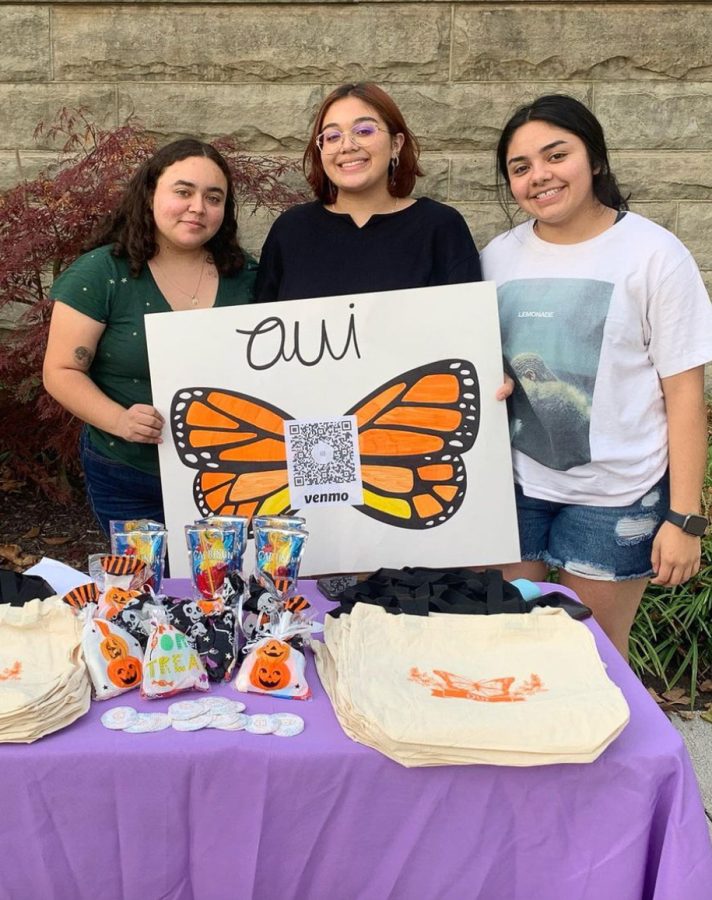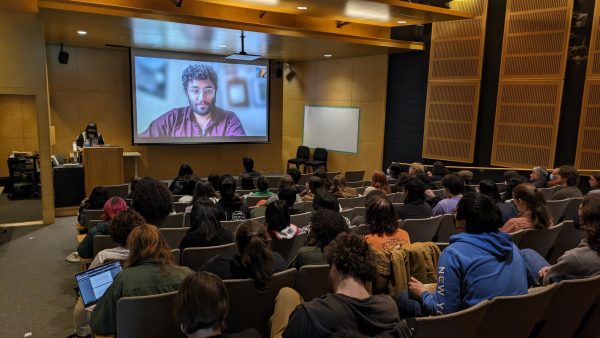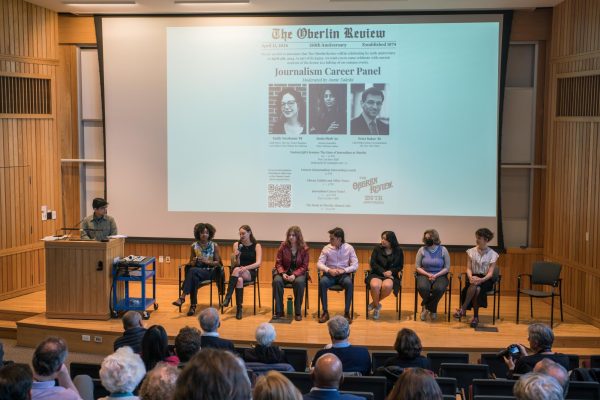OUI Navigates Rebuilding Group Identity and College Relations
Obies for Undocumented Inclusion has grown its public presence in recent years through outward-facing events, some of which — like Immigrant Narratives Night and the El Centro Volunteer Initiative Art Gala — have seen significant turnout from members of the Oberlin community. However, the organization’s mission of securing safety, comfort, and equal opportunity for undocumented Oberlin students is tied to the less-visible push for internal change within the College, which involves collaborating with administration to make resources for undocumented students easily accessible and establishing norms around their treatment.
According to College second-year and OUI board member Lily Baeza, undocumented students face unique difficulties. Professional development training for students may not always offer a roadmap for individuals who don’t have work authorization and can only receive payment via non-employment stipends for jobs secured through the College — which can’t pay them for contracted work because the College keeps a record of students’ undocumented status. Similarly, while U.S. citizens may receive information on filling out the FAFSA, undocumented students who don’t qualify for federal student aid turn to each other for guidance in filling out their annual financial aid forms, which is a separate process entirely.
“The biggest hurdle, I feel like, is getting here,” Baeza said. “And once you’re here, it’s just trying to survive. You don’t have a way to legally work, so how are you going to get money? And on campus, one of the only ways to get money as an undocumented student is through [the Bonner Scholars Program], cause they pay through stipend … if you don’t have Bonner, what are you going to do for work?”
After they graduate, undocumented students also face a different reality than their documented classmates.
“A lot of people are excited to graduate, but I feel like as an undocumented student, once you graduate, you’re done,” Baeza said. “Because you have your degree, you have all this knowledge, you have experience, you can do the jobs, but you don’t have citizenship, which is what a lot of jobs require.”
OUI hosts fundraisers throughout the year, like the Pajama Solidarity Walk, to contribute to the OUI fund, which was created to alleviate the financial burden carried by undocumented students with severely restricted employment opportunities. But before the current iteration of the fund was created, OUI raised $50,000 toward an undocumented student fund, which was endowed by the College in 2016 to ensure its stability and longevity. It was officially titled the DREAM Endowed Fund for Undocumented Students. However, with its new designation as a scholarship, the fund lost much of its usefulness, according to student recipients.
“It can only be used for tuition, which is an issue, because many undocumented students already have full tuition scholarships,” College fourth-year and OUI board member Minerva Macarrulla said. “It was envisioned as a fund that could be used for anything, like for emergency funding, for room and board costs, for DACA renewals. … So, we were really frustrated with the fund. And also, there’s no way to apply to it. We have one student who, at one point, saw on her bill that she was given the fund, and it had no impact on how much she was paying at all.”
In the years before the COVID-19 pandemic, OUI lost a point of connection with the Multicultural Resource Center after a restructuring eliminated community coordinator positions. Community coordinators, who often worked with identity groups that corresponded with their own, would act as channels between student organizers and faculty members.
“The capacity for leadership development in student organizations, the capacity for institutional memory in student organizations, was incredible, because their role was literally to pass down that institutional memory — to train people who were leading student organizations to be better leaders, to mediate conflicts between people in these organizations and just really to honor the work that people who lead marginalized student organizations do,” Macarrulla said.
This year, OUI has made significant headway in rebuilding relationships with administrative offices across campus. In regular meetings with the MRC, OUI board members have been developing an UndocuAlly training tailored toward faculty and staff, to equip them to provide resources for undocumented students, even in the form of information.
“We’ve been working a lot with [Vilmarie Perez, assistant director for career readiness at the Office of Career Exploration and Development],” Baeza said. “She’s been great. She’s helped us figure out summer experiences, summer funding — anytime she finds out about an internship or something, she always emails us about that. She’s also been present at most of our meetings, so even her advocating for us a lot has been great.”
OUI’s willingness to take initiative in establishing and maintaining administrative contacts, as well as occupying a more visible role on campus, is a fairly recent development within the organization.
“We’ve changed OUI a lot in our time,” Macarrulla said. “It used to be very secretive … there was a really, really big emphasis on confidentiality. And I don’t think that we’ve lost the emphasis on confidentiality where it really matters. Like, we never ask anyone to disclose their status at OUI meetings.”
Now, the organization’s presence on campus is difficult to miss, with events publicized on bulletin boards, through posts on social media, and College publications. The change was catalyzed by a meeting staged between OUI board members and a fellow organizer for undocumented students operating on a different campus. When OUI members expressed their hesitancy in publicizing an UndocuChill session exclusively targeted toward undocumented students, their contact suggested a radical reorientation.
“He said, ‘Invisibility is just damaging’,” Macarrulla said. “He really emphasized the power of visibility in building support for undocumented students, and the fact that something always could happen — but better that you be visible as a campus organization and have something bad happen to you, than have no one know that you exist and have something bad happen to you. Because then you can draw on more of a network of support.”
OUI has not only increased its visibility but has also leaned into the intersections between their organization and other identity-based student groups, to broaden their community and share resources between organizations working toward mutual goals.
“I think it’s just us realizing that if, as identity orgs and as POC orgs, we don’t support each other, nobody else will,” Baeza said. “During our events, like during the art gala, a student came up and promoted [African Student Association] events. As identity orgs, we’ve definitely realized that if we’re not there for each other, then nobody will be.”




